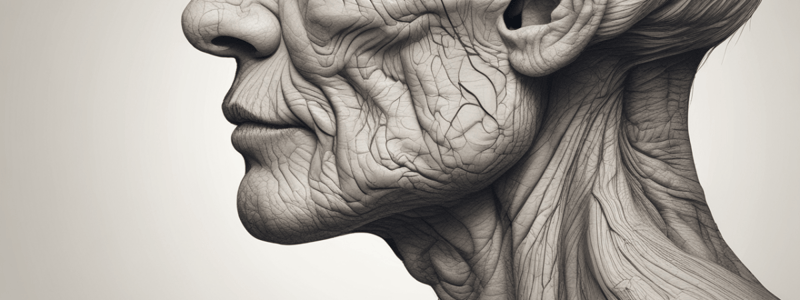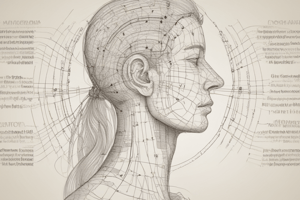Podcast
Questions and Answers
What primarily causes wrinkle lines on the face?
What primarily causes wrinkle lines on the face?
- Excessive sun exposure only
- Repeated folding of the skin and loss of elasticity (correct)
- Use of harsh skincare products
- Genetic factors without environmental influence
In relation to muscle activity, wrinkles are formed due to which of the following?
In relation to muscle activity, wrinkles are formed due to which of the following?
- Folding of skin perpendicular to muscle contraction (correct)
- Relaxation of all facial muscles
- Increased hydration of the skin
- Alignment of the facial muscles with skin
What happens to the skin as it ages that contributes to wrinkle formation?
What happens to the skin as it ages that contributes to wrinkle formation?
- Excess collagen production
- Loss of youthful skin elasticity (correct)
- Increased skin thickness over time
- Greater water retention in skin cells
Which of the following factors does NOT directly contribute to the folding of the skin that results in wrinkles?
Which of the following factors does NOT directly contribute to the folding of the skin that results in wrinkles?
Which of the following best explains the relationship between muscle contraction and skin appearance?
Which of the following best explains the relationship between muscle contraction and skin appearance?
Which facial orifice is protected by the eyelids?
Which facial orifice is protected by the eyelids?
What guards the nostrils in the facial anatomy?
What guards the nostrils in the facial anatomy?
Which of the following is NOT one of the facial orifices mentioned?
Which of the following is NOT one of the facial orifices mentioned?
Which structure is responsible for guarding the mouth?
Which structure is responsible for guarding the mouth?
Which facial orifice do the lips guard?
Which facial orifice do the lips guard?
What anatomical structure does the inferior labial artery primarily supply?
What anatomical structure does the inferior labial artery primarily supply?
Where does the inferior labial artery originate?
Where does the inferior labial artery originate?
What is the relationship between the inferior labial artery and its counterpart on the opposite side?
What is the relationship between the inferior labial artery and its counterpart on the opposite side?
Which of the following statements about the inferior labial artery is incorrect?
Which of the following statements about the inferior labial artery is incorrect?
Which direction does the inferior labial artery run after its origin?
Which direction does the inferior labial artery run after its origin?
What muscle does the cervical branch primarily supply?
What muscle does the cervical branch primarily supply?
Where does the cervical branch emerge from?
Where does the cervical branch emerge from?
Which direction does the cervical branch travel in the neck?
Which direction does the cervical branch travel in the neck?
What additional muscle may the cervical branch supply?
What additional muscle may the cervical branch supply?
Which anatomical landmark does the cervical branch cross?
Which anatomical landmark does the cervical branch cross?
Which vein connects the system to the pterygoid venous plexus?
Which vein connects the system to the pterygoid venous plexus?
What is the role of the superior ophthalmic vein in this vascular system?
What is the role of the superior ophthalmic vein in this vascular system?
What structure is involved in the connection to both the pterygoid venous plexus and the cavernous sinus?
What structure is involved in the connection to both the pterygoid venous plexus and the cavernous sinus?
Which of the following veins is NOT mentioned in the context of the pterygoid venous plexus or cavernous sinus?
Which of the following veins is NOT mentioned in the context of the pterygoid venous plexus or cavernous sinus?
Which of the following correctly describes the relationship between the veins mentioned?
Which of the following correctly describes the relationship between the veins mentioned?
Study Notes
Facial Anatomy
- Wrinkle lines on the face form due to repeated skin folding perpendicular to the long axis of contracting muscles, combined with the loss of youthful skin elasticity.
Orifices of the Face
- The face has three orifices: the orbit (eye), nose, and mouth.
- Each orifice is guarded by a specific structure: eyelids (orbit), nostrils (nose), and lips (mouth).
Blood Vessels of the Face
- The inferior labial artery originates near the angle of the mouth.
- It runs medially in the lower lip and anastomoses with its counterpart on the opposite side.
- The deep facial vein connects the inferior labial artery to the pterygoid venous plexus.
- The superior ophthalmic vein links the inferior labial artery to the cavernous sinus.
Cervical Branch
- The cervical branch emerges from the lower border of the gland.
- It passes forward in the neck, below the mandible, to supply the platysma muscle.
- The cervical branch may cross the lower margin of the mandible to supply the depressor anguli oris muscle.
Studying That Suits You
Use AI to generate personalized quizzes and flashcards to suit your learning preferences.
Related Documents
Description
Learn about the formation of wrinkles on the face due to muscle contractions and loss of skin elasticity. Understand the underlying causes of wrinkles and how they develop.




